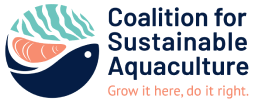The majority of the seafood we consume in the United States is imported, making it difficult to know how safe and sustainable our seafood actually is. That’s why the Coalition for Sustainable Aquaculture supports the bipartisan Science-based Equitable Aquaculture Food (SEAfood) Act.
This legislation would protect our shared ocean with a science-based, stakeholder-led legislative approach. This would establish strong environmental and social standards for the development of a thriving, well-regulated U.S. offshore aquaculture industry.
Specifically, the SEAfood Act would provide the critically needed framework to develop sustainable open ocean aquaculture through U.S. government studies. It would pave the way for on-the-water, field research assessments to address key knowledge gaps. The SEAfood Act would also provide opportunities for historically disadvantaged and excluded communities to access and benefit from growing a more robust U.S. aquaculture industry.
We’re Showing Up for Science
The Coalition for Sustainable Aquaculture is committed to ensuring Americans have access to sustainable, locally sourced seafood, and making sure we grow it here and do it right. CSA’s diverse membership includes chefs, fishers, seafood farmers, industry, ENGOs, and more—all charting a responsible path forward for open ocean aquaculture.
It’s not just CSA members who want sustainable seafood. It’s increasingly a priority for American consumers. A report produced by CSA member Environmental Defense Fund on American Voters’ Views on Aquaculture found that 70% of Americans say they would eat more seafood if there were higher safety standards for farmed fish.
People want to know where their seafood comes from and that they can trust it. When voters hear that the U.S. imports 90% of the seafood we consume and half of that comes from aquaculture, they see the potential for domestically produced aquaculture to help satisfy the growing demand for seafood. At the top of their priorities are expanding economic opportunities and ensuring seafood is safe and healthy.
The bottom line is that we need science. We need members of Congress to ensure that as aquaculture develops in the open ocean (and it will), aquaculture remains a part of regulatory discussions and research funding priorities. This will help ensure high standards for safe, sustainable aquaculture that voters want to see.
We’re Showing Up for the SEAfood Act
Although there are not currently any seafood farms in U.S. federal waters (which are typically between three and 200 nautical miles off the U.S. coast), aquaculture is the fastest growing food production method globally. We know the aquaculture industry will continue to grow, and open ocean aquaculture in the U.S. isn’t a question of if and when, it’s a question of where and how.
The U.S. could become a global leader in sustainable open ocean aquaculture. But, we lack a comprehensive federal regulatory framework or clear and accessible permitting structure for domestic offshore aquaculture. That means domestic aquaculture industry growth is vulnerable to regional and state-driven regulatory inconsistencies.
Some decision makers are already seeing the potential for increasing aquaculture in the U.S., with legislation proposed like the:
- Sustaining Healthy Ecosystems, Livelihoods, and Local Seafood (SHELLS) Act sponsored by Reps. Bonamici (D-OR) and Wittman (R-VA)
- Coastal Seaweed Farm Act of 2023 sponsored by Reps. Huffman (D-CA) and Peltola (D-AK)
- Supporting Equity for Aquaculture and Seafood (SEAS) Act sponsored by Reps. Cammack (R-FL) and Pallone (D-NJ)
- Advancing the Quality and Understanding of American Aquaculture (AQUAA) Act sponsored by Sens. Wicker (R-MS) and Schatz (D-HI) and Reps. Cammack (R-FL) and Case (D-HI)
- Promoting American Competition in Aquaculture Research Act sponsored by Sens. Hirono (D-HI) and Wicker (R-MS) and Reps. Tokuda (D-HI) and Wittman (R-VA)
We’re Showing Up for Each Other
CSA members are coming to Washington, D.C. May 21-24 to voice support for the SEAfood Act, advocate for sustainable open ocean aquaculture, and share lived experiences. We are working to ensure safe and environmentally responsible access to valuable nutritious (and delicious) resources, and we hope to talk to many offices about how the SEAfood Act can play an important role in the U.S.’s safe, sustainable seafood industry.
CSA chefs and nutritionists want to make sure they, their customers and their communities have access to nutritious and sustainably sourced seafood for generations. These fishermen want members of Congress and their staff to know that U.S. aquaculture can and should develop as a complement to wild fisheries so that more domestic seafood can be made available for more Americans.
By supporting the SEAfood Act, we are working to safeguard our livelihoods, communities, and futures. There is a lot on the line, but there is also so much to be gained.
Photo Credit: Sammy Monsour

